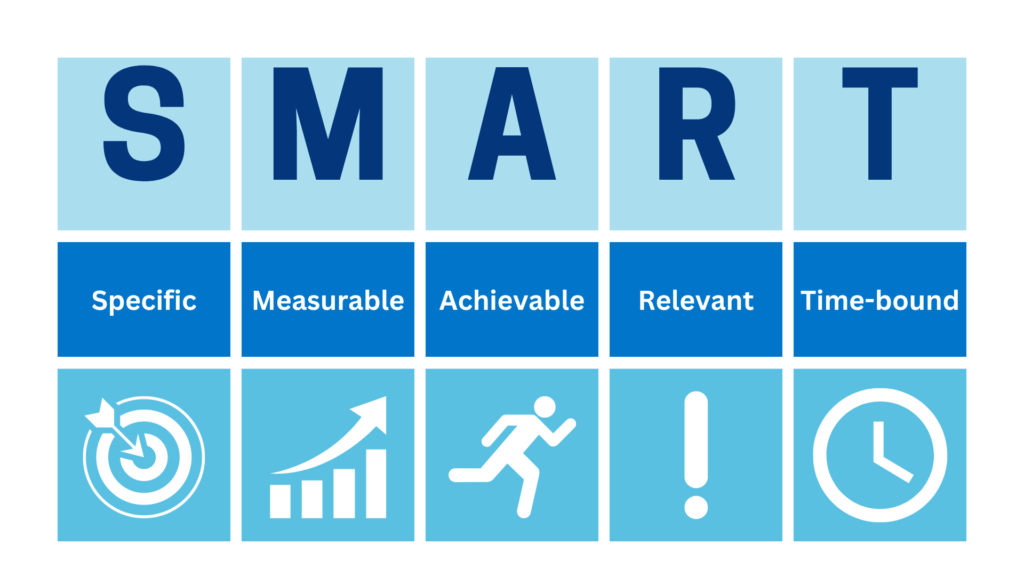Your cart is currently empty!

Creating SMART public speaking goals
Speaking in a thousand venues can be the dream, but without a precise goal, it may feel a bit empty to you. Did you improve? Were you better than last time? Better in what exactly?
You may feel disappointed when you are not sure whether you improved or not. That’s why you need to define your goals. What do you want to achieve?
Creating goals is the way to improve in any skill you like. It is a way of knowing which direction to go, and public speaking is no different. Yet, creating reasonable goals isn’t always easy. That’s why you should know the SMART way.
What is SMART?
SMART is the acronym for a group of criteria to define goals in an optimal way. The letters stand for Specific, Measurable, Achievable, Relevant and Time-bound. Following these concepts when defining your goals will help you reach them.

When creating your goal, you need to address each one of these concepts and see if it fits. It has to be specific, easy to understand, and as simple as possible. This will help you find the best way to measure your success.
Speaking of goals, be realistic about your goals. They need to be achievable. If you set up a plan that’s almost impossible to achieve, what’s the point?
The relevance of the goals is also important. You shouldn’t impose a goal on yourself that isn’t relevant to your life, career, or education in any way.
It must be time-bound as well. When do you decide if it was achieved or not? Generalist goals you think about achieving eventually during your lifetime aren’t good. You need a ‘when’.
Public Speaking Goals
The success of your public speaking activities is hard to measure. Applause at the end is hardly a way. In fact, your audience might just be delighted that you’ve finished rather than with your content and presentation. So, building objective goals according to the SMART method is an excellent way to help you measure your improvements.
Specific
The specificity of the goal should focus on many aspects, like where you want to talk, about what, and when. For example, your goal could be to speak at a TED talk, presenting a specific project of yours next year. This is specific, and it is easy to determine whether you achieved it!
Measurable
The next step is to ensure that you have a way to measure the goal’s success. In the example above, is having the opportunity to speak good enough? Probably not. After all, if you want to speak at a TED talk, you have some standards to meet, right?
Now, you need to find a way of measuring the success. This is entirely up to you. You can find a way to measure the engagement. You can measure by the number of views in the online video of your presentation, or any other idea you may have.
There are many possibilities, and as long as you end up with a measure of some sort, you have this step covered.
Achievable
Now, take a step back and ask yourself: is this goal achievable? If it isn’t, let me tell you that it is useless unless your final goal is to be frustrated!
You will not have the opportunity to speak at TED if you never gave a speech. It doesn’t matter how good you are in your field. So, let’s focus on small, achievable goals. Think of them as steps to reach what you really want.
Relevant
Then, you must understand why you want to achieve that goal. Obviously, you are entitled to have all sorts of petty reasons, but I need to advise you to worry about relevance.
Why reaching this goal is important? What impact would it have? Is it a step to reach a bigger one? If you don’t know the answer to these questions, you probably want to rethink your goal.
Time-bound
If you already have the perfect goal, it is time to decide when you should have achieved it. Having a window of time to do something is stimulant and helps you determine more objectively if you have reached it.
Be SMART
Establishing and pursuing goals is the best way to improve in any task. The SMART way is quite effective if you build your goals appropriately. It not only helps you achieve them but also boosts your motivation and self-esteem.
When building your goals, think carefully about each step and see how much your public speaking will improve. It is time to achieve!
Cátia is a psychologist who is passionate about helping children develop and train social skills.



Leave a Reply